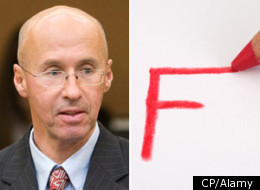 OTTAWA - Canada's budget watchdog is firing back at critics who have accused him of flip-flopping in declaring public pension programs sustainable.
OTTAWA - Canada's budget watchdog is firing back at critics who have accused him of flip-flopping in declaring public pension programs sustainable.In a letter to MPs and senators posted on the Parliamentary Budget Office Web page, Kevin Page takes a shot at individuals "without and with," expertise in the subject matter.
The four-page letter stresses that his analysis last week on the Old Age Security program which the Harper government has called "unsustainable" and in a "crisis" due to aging baby boomers, is based on concepts in use by the Congressional Budget Office in Washington and Britain's Office of Budget Responsibility.
Last week, Finance Minister Jim Flaherty dismissed Page's assessment of OAS as "unbelievable, unreliable, incredible." As well, Conservatives in the Commons have pointed out than only a few months earlier Page had questioned Ottawa's long-term fiscal sustainability.
Several national columnists have also taken up the cause, with one declaring it would be difficult to conclude that Page isn't a "partisan economist."
Page responded that weeks before his assessment on OAS, he had reversed his position on the sustainability of Ottawa's fiscal track.
That was because on Dec. 19, the Harper government declared it would no longer increase health transfers at an annual six per cent rate, but would in the future tie growth to the economy, or an anticipated four per cent escalator.
Expected increases in costs to support OAS in its current form don't change the equation, he said, since the government is saving much more on reduced health transfers.
Page's analysis of elderly benefits are similar to those already submitted by the government's chief actuary, with benefits rising in the next 20 years to about 3.2 per cent of gross domestic product, less than one percentage point more than current costs.
That figure is below the average of advanced economies and well south of what European governments pay out on public pensions.
"With the growth in the federal (health) beyond 2016-17 limited to nominal GDP growth, the PBO estimates that the federal fiscal structure now has sufficient room to absorb the cost pressures arising from the impact of population aging on the federal elderly benefits program," Page wrote.
The budget watchdog notes that the same is not true of the provinces, since Ottawa has simply downloaded the fiscal gap to the lower level of governments. Overall, Ottawa hasn't closed the fiscal gap he perceived in November, it has merely handed it to provincial governments, he said.
In a report Wednesday, economist Don Drummond called on Ontario to initiate dramatic cost cutting to reign it its budget deficit and to prevent its debt to GDP from shooting to 50 per cent.
Original Article
Source: Huff
Author: canadian press
No comments:
Post a Comment